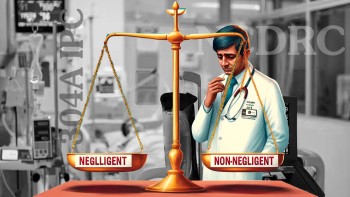After a historic decision by the Supreme Court, doctors are hopeful that, like lawyers, they will also be excluded from the purview of the Consumer Protection Act. A bench of two judges of the Supreme Court set aside the decision of the NCDRC, which had considered the services provided by lawyers to their clients under the Consumer Protection Act. Bench of Justices Bela M. Trivedi and Justice Pankaj Mithal has refered the 1995 IMA vs. VP Shantha case to Hon'ble CJI for consideration by a larger bench, where healthcare services were considered under the Consumer Protection Act.
"In view of the above, we are of the opinion that the decision of the three- judge bench, in case of Indian Medical Association vs. V.P Shantha (supra) deserves to be revisited and considered by a larger bench. We, therefore refer the matter to Hon’ble the Chief Justice of India for His Lordship’s consideration,"mentions the SC order
The bench observed that,the summary nature of proceeding under the consumer protection law with its accent on inexpensive and speedy remedy
(though enacted with laudable objects for protection of consumers against trade and commercial activities), can become an easy tool for disgruntled litigants to knock at the doors of the consumer forums against the advocates. It would lead to
speculative/vexatious claims, rather than seeking relief in respect of bona fide grievances against professional misconduct.
The legal profession is recognized as sui generis and stands out among other profession due to its distinctive nature, where the lawyers often find themselves operating in an environment where control is elusive. Unlike many other professions where practitioners may have a higher degree of control over their surroundings, the lawyers frequently navigate through complex legal landscapes shaped by diverse factors,court observed.

The court observed that one of the primary distinctions of legal profession is the inherent complexity of legal issues. Lawyers must grapple with intricate statutes, case laws and regulatory frameworks, which often lack definitive answers. Legal disputes frequently involve multiple parties with conflicting interests, further complicating the matters. Unlike some other professions where problems may have more straightforward solutions, the lawyers often face ambiguity and uncertainty in their work, making control over outcomes elusive.
Lawyers are bound by ethical and professional obligations that constrain their autonomy and control over their work. Adherence to the codes of conduct, client confidentiality, and obligations to the court limit the freedom of lawyers to act solely in their own interest or according to their preferences.
The Hon'ble court concluded that-
-The very purpose and object of the CP Act 1986 as re-enacted in 2019 was to provide protection to the consumers from unfair trade practices and unethical business practices, and the Legislature never intended to include either the Professions or the services rendered by the Professionals within the purview of the said Act of 1986/2019.
-The Legal Profession is sui generis i.e. unique in nature and cannot be compared with any other Profession.
-A service hired or availed of an Advocate is a service under “a contract of personal service,” and therefore would fall within the exclusionary part of the definition of “Service” contained in Section 2 (42) of the CP Act 2019.
A complaint alleging “deficiency in service” against Advocates practising Legal Profession would not be maintainable under the CP Act, 2019.
Now, the medical community sees this decision as a significant opportunity, and many doctors beleive that based on the same grounds that lawyers have been exempted from the Consumer Protection Act, doctors should also be excluded from its purview. Even in 2019, when the Consumer Protection Act 2019 was passed by the Parliament, the intent was to keep healthcare services out of its ambit. Like lawyers, doctors in India also have the National Medical Commission and State Medical Councils to ensure compliance with the code of conduct and ethics while performing their duties. Additionally, patients still have the option to seek resolution of their greivances in civil or criminal courts. The medical community has always argued that since the medical profession is highly complex and many factors are involved in patient treatment, disputes related to medical services should be resolved in civil courts rather than through summary procedure of consumer commission.
To access the order click here-






Recent comments
Latest Comments section by users
Guest
May 15, 2024
Judgement itself mentions that medical profession was kept out of CPA in 2019 act by parliament IMA failed to get it implemented and we were made to suffer Hope this time mistake will not be repeated Prof (Dr) Rajveer Arya
Guest
May 16, 2024
Let law be complex. Lawyers should be accountable to lapse. The era of "King and family is out of legal purview" is not acceptable.